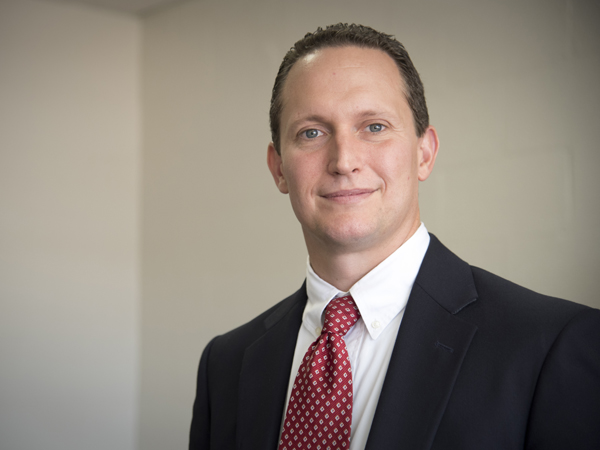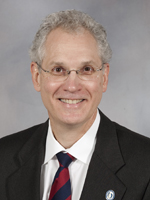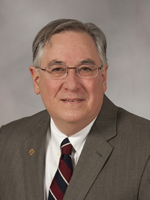Mann of the hour revives Department of Preventive Medicine

Published in News Stories on August 27, 2015
As a boy, Dr. Joshua Mann was fascinated by numbers, particularly, 1, 51 and 22 - those worn by, respectively, Ozzie Smith, Willie McGee and Jack Clark.
The young Mann was a St. Louis Cardinals fan riveted also by batting averages, home runs, runs batted in - measures of frequency and probability. Performance converted into digits.
Today, he's engrossed by figures from a different sphere, but which offer a similar service: measuring incidence, prevalence and distribution.
But, instead of hits, he studies human health; instead of dingers, it's human disease - the province of epidemiology, and his province as the newly-arrived chair of the reconstituted Department of Preventive Medicine.
"Preventive medicine deals, in large part, with how realities about health can be translated into numbers," said Mann, a UMMC medical school alumnus whose previous position was associate professor of family and preventive medicine at the University of South Carolina School of Medicine.
"It deals with what we can do to improve those realities on both the individual and population levels.
"It asks, 'what do statistics say about reality?' That's what epidemiologists do."
There's another reality facing Mann: reviving a department that has been dormant since 2007, which also means creating a residency program from scratch.

Smith
"He's building this department from the ground floor," said Dr. Patrick Smith, chief faculty affairs officer and professor of family medicine.
"This is a marathon, not a sprint," said Smith, who chaired the search committee for the chair. "Dr. Mann has age on his side; he has energy on his side. He also understands the larger responsibility the institution has for the health needs of the three million people in this state."
The department's demise in 2007 had several causes, such as loss of faculty, lack of student enrollment and a diminished focus on preventive medicine.
Those reasons, along with other financial priorities, led to its suspension, said Dr. Ralph Didlake, professor of surgery and associate vice chancellor for academic affairs.
But, with changing health-care needs, such a department is more important than ever, he said.

Didlake
"There has been such a dramatic shift toward wellness and prevention," said Didlake, who is also director of the Center for Bioethics and Medical Humanities.
"It's not only smart, it's very cost-effective. The economic development features of maintaining a healthy work force are obvious."
As Mann put it: "Medical care, traditionally, is mostly about reacting to disease. Preventive medicine tries to stop disease before it starts, which is often more effective."
The discussion to revive the program began at least five years ago, Didlake said. When the Medical Center received grants to explore the idea, the effort got a push, and a year-long nationwide search for a chair and reviver began.
"We found exactly the right Mississippian at exactly the right time," Didlake said.
Mann was born in Greenville and grew up in south Mississippi, in the Stone County town of Perkinston. There, at Mississippi Gulf Coast Community College's main campus, his parents taught chemistry and biological sciences.
Like them, Mann had a head for figures, but used his to memorize baseball players' stats on the backs of trading cards.
Numbers absorbed him when they were attached to people's health and lifestyles. "I was always interested in human behavior," he said.
This interest endured throughout his undergraduate years at Delta State University, and during his stretch as a medical student at UMMC, class of 1996. When it was time for his residency, he chose preventive medicine, in part, to help people "make healthier choices in life," he said.
That means focusing on nutrition, physical activity, work safety, vaccinations, health screenings and more.
"Environmental factors, such as income, insurance, mental or spiritual well-being, we have less control over," Mann said, "but we can teach students what to look for and how to help people protect their health.
"During my training, I often had the thought that what I saw in clinic could have been prevented -- 'How can we make this better?'"
As a resident at the University of South Carolina, he also earned a Master of Public Health degree, completing both in 1999, the year he joined the Medical Institute for Sexual Health in Austin, Texas, as director of research.
Three years later, he was back in Columbia, S.C., as a member of the preventive medicine faculty at USC, where he would remain until arriving at UMMC on July 1 with his wife Beverly, a Long Beach native, their daughter, Catie, 11, and son, Jonathan. 8.
Mann brought with him a resume packed with achievements in research, particularly in these areas: risk factors for adverse pregnancy outcomes, the health of people with disabilities, and the epidemiology of mental health - especially the influence of religion and spirituality.
Among his other qualifications is his experience as director of USC's residency program in preventive medicine. Building the same kind of program here is a major priority.

Beech
Mann's accomplishments in residency education are "outstanding," said Dr. Bettina Beech, associate vice chancellor for population health and professor of pediatrics and family medicine, as are those in patient care and research.
"Dr. Mann will also be able to attract more physicians trained in preventive medicine as partners with the state Department of Health through that program.
"I'm thrilled to have the Department of Preventive Medicine re-established here. It's great to see folk who were trained here come back and catapult our mission."
Recruiting medical students to his specialty is one reason Mann wanted to come back to Jackson, he said. "The department can certainly impact the state's public health needs that way.
"Preventive medicine is probably not ever going to compete with the bigger specialties for numbers. But I can tell you that students are more aware than ever of the importance of prevention." That should mean a renewed interest in preventive medicine as a specialty, he said.
Another reason Mann sought his new job: "I was very impressed with the institution's direction and with its growth since I left in 1996. I believe people are, and should be, proud of the Medical Center."
The son of a part-time minister, Mann will spend some of his free time attending his children's sports events and participating in church activities - "I've always really enjoyed singing in church and hope that I'll be able to do that here as well," he said.
He also regularly lifts weights and jogs. When it comes to prevention, he said, "I'm trying to live the talk."


